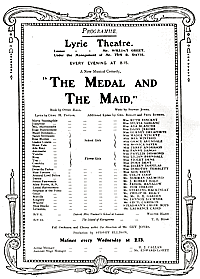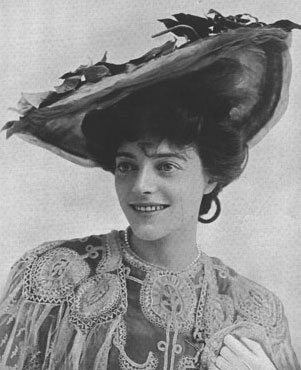
The Medal and the Maid
Book by Owen Hall, Music by Sidney Jones, Lyrics by Charles H. Taylor.
Additional lyrics by George Rollit and Paul Rubens
Lyric Theatre, London - 25 April, 1903 (revised 15
August,1903
Broadway Theatre, New York - 11 January, 1904 ransferred to the Grand Opera House, New York on March 14th. 1904.(49 perfs)
Synopsis
The sacred traditions of musical plays are invariable, the foremost of them is that at any given moment, any person can be anybody else without detection, and with complete success and that, further, they may resume their identity in an equally inconsequent manner and with the approval of all concerned.
When Josephine appears with a medal, the gift of her father, who thus discharged his parental duties to his daughter and disappeared, we are prepared to recognise, or to see others recognise, Josephine in any temporary possessor of that token.
Merva Sunningdale, an heiress, and a pretty one too, knowing this, sees her chance of a little fun, and when on her way to Miss Ventnor's school she meets Josephine, the exchange is quickly made, and though their attires have changed, it is the medal that does it. Thus we start very early with an heiress who is really a flower girl and a flower girl who is really an heiress. There would be no further consequences involved in such a change were it not for incidents in the recent careers of both ladies and which tends towards confusion. Merva, the heiress (now a flower girl), had met a young officer at Colombo, and "the attraction had been mutual," whereas Josephine, the flower girl (now an heiress) had, in a fit of temper, provoked by the undue familiarity of a sailor, stabbed her tormentor with a knife that she had kept concealed in her stocking.
Whilst Nemesis pursues in hot haste both damsels, we can turn to Miss Ventnor, the proprietor of a highly-original ladies' academy, where the pupils are prepared on the most modern lines for their ultimate entrance into polite society. Of the students' qualifications we learn at a prize distribution, Miss Ventor having secured a gallant admiral to preside at the function. It is a smart affair and is graced by the presence of the élite of Cannes, among whom we find Mrs. Habbicombe and her eccentric literary friend, Mr Simon Pentweazle.
 |
Miss Ventnor played by Ada Reeve |
Now, when we get to know her, Mrs Habbicombe is a very great lady, or a very rich one - which is, of course, the same thing - and the appearance of Simon on the scene is due to his admiration of her many charms. This flame had not been fanned at fashionable receptions or social gatherings; it was not at the houses of the great that Simon had met his Jane, but in the capacity of business manager to Mrs Ezra Hart, dealer in old clothes. That lady had won his heart by her shrewdness and capability, and Mrs Ezra Hart is none other than the smart Mrs Habbicombe. Now, admiration in Goswell Road is one thing, but when it journeys thence to Cannes, and is obtrusive after the Goswell Road fashion, it becomes a thing to be dreaded. So Simon, having a taste for poetic quotation, is introduced as a literary friend, and takes quite a creditable position at the prize distribution.
Meanwhile, Nemesis is at hand. The young lieutenant turns up and recognises in the local flower girl, the girl he met and fell in love with at Colombo. A sergeant of the gendarmerie arrives at about the same time and arrests her for the little stabbing affair that is part of the career of Josephine. Whether she was bailed out or whether the charge failed for want of evidence we do not learn, but, it is quite certain that we meet both the sham flower girl and the false heiress free, on the island of Karogovina, where all the parties have repaired for a trip. The school is there, so is the charming schoolmistress, so are some particularly ferocious, but methodical, brigands. So too, is Darien, the chief of bandits, who proceeds to imprison all and sundry for the sake of the heavy ransoms he means to demand. Obviously, however, they cannot all be kept on the island. Food is scarce and the ransom value of some of the crowd is not worth their keep. Who then shall be kept and who shall be sent away? To solve this problem, Darien makes use of the schoolmistress, whose information on the point is valuable, and whose company is far from unwelcome.
Miss Ventnor makes a rapid conquest and is conquered, but what is much more to the point, gives him the information he seeks. Darien wants the wealthiest left behind. Miss Ventnor has an heiress among her pupils. The heiress shall stay and the thing is settled.
In true musical comedy fashion the story unwinds from tangle into tangle, but in the end, the happiness of the real Merva and her lieutenant, who are married after the laws of Karogovina, and after that - nothing really matters.
Musical Numbers
ACT I - Public Gardens at Cannes.
- Opening Chorus - "We have come from the ends of the earth to the Mediterranean Sea, and we're going for all we are worth to be jolly as jolly can be..."
- Octette and Chorus - "The Polo championship we claim of all the Riviera, for none can beat us at the game, from Cannes to Bordighera..."
- Song - Miss Ventnor and Chorus - "In gen'ral terms you might allude to my Curriculum; review the subjects I include in my Curriculum..."
- Concerted Number - "If you'll follow us pray, we will show you the way that conducts to Acacia Villa. It's contiguous but we avoid a short cut..."
- Chorus and Song - Josephine - "What is the matter? Bid her be gone - we want no interlopers here to interfere with our affairs, and she is one..."
- Duet - Merva and Josephine - "Come kind gentlemen, buy my posies; I have violets, jonquils, roses. Ev'ry blossom that sweetly blows is here today..."
- Song - Levanter - "One fellow has some fault to find with ev'ry girl he sees; another can't make up his mind: I'm not so hard to please..."
- Song - Miss Ventnor and Schoolgirls - "Of marks of high distinction we hear of many types; the soldier and policeman receive good conduct stripes..."
- Song - Pentweazle and Chorus - "All the world's a seminary where, as circumstances vary, we are learning to be foolish or be wise..."
- Song - Merva - "Free, free at last I am going to be! No more school bell's early morning clamour. No more lessons at all for me..."
- Quartette - Pentweazle and others - "I'm going to be a Marquis, and I wonder if they'll let me wear a silver gilt electro-plated coronet!"
- Shoeblack Dance - Polka , Graceful Dance, and the Storm
- it's now to be a roamer in the classic land of Homer! We have never yet look'd forward to a trip so..."
ACT II - A wild territory in the Island of Karagovina.
- Entr'acte
- Chorus of Brigands, etc. - "We gladly welcome ev'ry time the enterprising folks who climb from crag to crag and slowly drag their limbs to our abode..."
- Duet - Mrs. Habbicombe, Pentweazle and Chorus - "If ever you're going to travel about, it isn't advisable starting without a person proficient in guiding..."
- Song - Darien - "It's very like a satire that the people of a nation, possessed of ev'ry peaceable proclivity, should have to take to Brigandage..."
- Duet - Merva and Allen - "One day a maiden wander'd down a sunny country lane, and as she went, there pass'd close by a tall and handsome swain."
- Song - Miss Ventnor and Girls - "Though few of us are clever, and though fewer still are great, yet we all can be celebrities today..."
- Duet - Miss Ventnor and Darien - "You shall reign o'er my heart in a kingdom apart, and love's flame shall be constant and steady..."
- Song - Mrs. Habbicombe and Chorus - "There was once a most delightful little charmer, tho' it struck me as peculiar to find..."
- Song - Merva - "O foolish men! it goes to prove you anything but wise, to talk about the girls you love as angels from the skies..."
- Song - Elsie and Chorus - "Katie had a Kodak, with a shiny lens; Katie used to photograph her relatives and friends..."
- Levanter and Chorus - "There are lots of little stories which I reckon ... which I reckon ... if examined, would assume another shape..."
- "Send your friends to Karagovina ... Karagovina, Vive! ... If they're wealthy, and would be happily married and done for..."
Cast
- Josephine
- Merva Sunningdale
- Mrs. Habbicombe
- Elsie Habbicombe
- Miss Ventnor
- Admiral Lord Belton
- Levanter
- Simon Pentweazle
- Darien
- Sergeant Blakeley
- Allen Blythe, R.N.
- Lionel Habbicombe
- Flower Girls: Antoinette, Violette, Rosa, Tita. Conchita, Marie
- School Girls: Ilma Malden,
Sarah Sevenoaks =,
Maud Hersham,
Gladys Combe,
Mona Valez,
Ada Bray
- Young Gentlemen: Grant, Melville, Kingsley, Blakeley, Wheeler